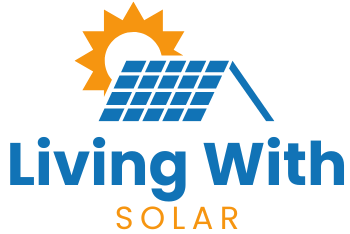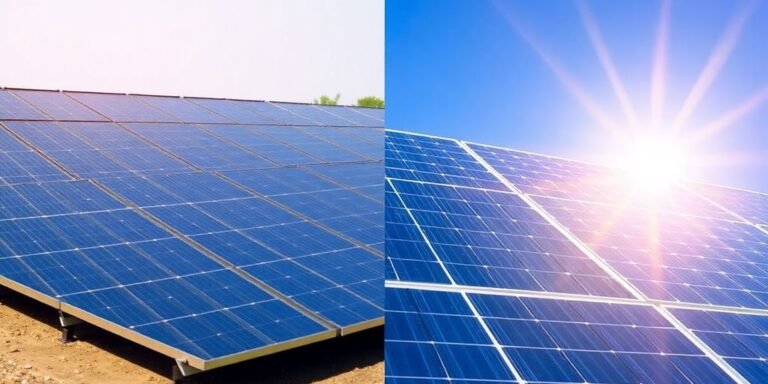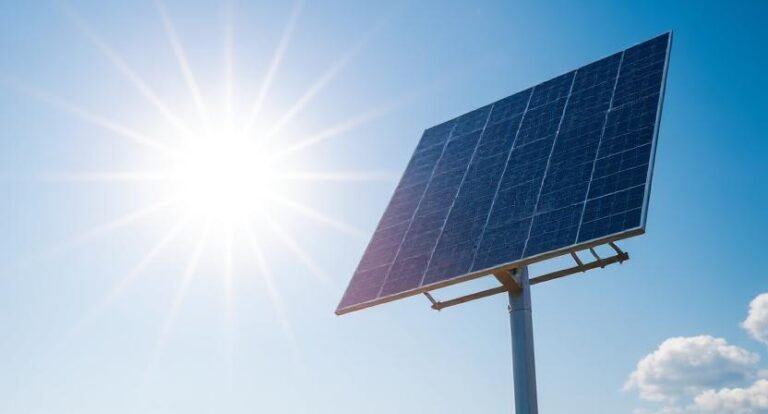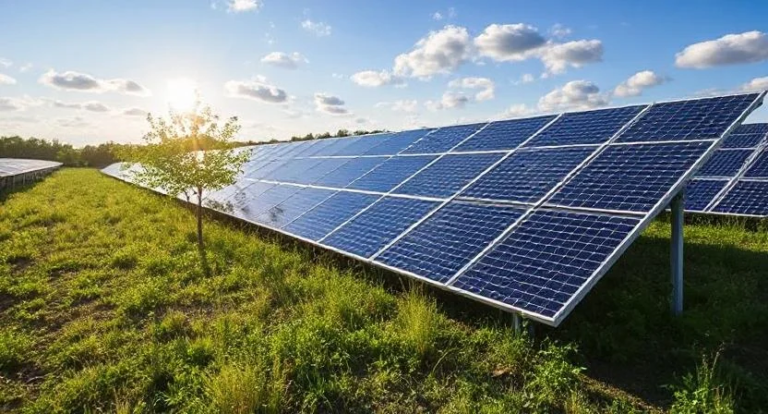Considering whether solar energy is a worthwhile investment for your home involves a careful evaluation of costs and potential savings. While the initial outlay may seem substantial, the long-term benefits could surprise you. From reduced utility bills to environmental considerations, the decision to go solar involves a complex financial equation that may just tip in your favor. Keep in mind the various incentives, payback periods, and overall impact before making your decision.
Key Takeaways
- Significant long-term savings from reduced electricity bills.
- Net metering allows selling excess energy back for credits.
- Solar panels last around 25 years, ensuring lasting benefits.
- Properties with solar installations often sell for higher prices.
- Tax incentives and rebates can offset initial installation costs.
☀️ Discover Solar Solutions – Visit livingwithsolar.com →
Initial Investment Costs
When considering solar energy for your home, one of the initial factors to evaluate is the investment costs involved.
Installing solar panels can be a significant upfront investment, but the long-term benefits often outweigh the initial expenses.
The cost of a solar energy system varies depending on factors such as the size of your home, energy needs, and location.
On average, the cost of a residential solar system can range from $15,000 to $25,000 before incentives or rebates.
It’s essential to consider the potential savings on your electricity bills over time when evaluating the investment costs.
With solar energy, you can significantly reduce or even eliminate your monthly electricity expenses.
Additionally, many governments and utility companies offer incentives, tax credits, or rebates to help offset the initial investment in solar panels.
While the upfront costs may seem daunting, remember that solar energy is a long-term investment that can increase the value of your home and contribute to a more sustainable future.
Solar Panel Installation Expenses
Considering solar panel installation expenses is a practical step towards harnessing solar energy for your home.
The cost of installing solar panels can vary depending on factors such as the size of your home, energy needs, and location.
On average, the installation expenses for a solar panel system can range from $15,000 to $25,000 before any incentives or rebates are applied.
This investment covers not only the solar panels themselves but also the mounting equipment, wiring, and labor costs.
It’s essential to obtain quotes from multiple solar energy companies to ensure you’re getting a competitive price for the installation.
While the upfront costs may seem significant, it’s crucial to consider the long-term savings and benefits of solar energy.
By generating your electricity through solar panels, you can potentially reduce or even eliminate your monthly utility bills.
Additionally, you may be eligible for various incentives and rebates that can help offset the initial installation expenses.
Keep in mind that the overall savings and environmental impact of solar energy make it a worthwhile investment for many homeowners.
Available Tax Incentives
Exploring available tax incentives can significantly impact the overall cost of installing solar panels for your home.
The federal government offers a Residential Renewable Energy Tax Credit, which allows you to claim a percentage of your solar panel system costs as a credit on your federal taxes.
This credit can reduce your tax bill dollar for dollar, making solar energy more affordable.
Additionally, some states offer their own tax incentives, such as rebates, exemptions, or credits, further lowering the upfront costs of going solar.
It’s essential to research and understand the specific tax incentives available in your area, as they vary by location and are subject to change.
Utility Bill Savings
To understand the financial benefits of solar energy for your home, let’s delve into the significant utility bill savings you can expect.
By installing solar panels, you can significantly reduce your monthly electricity expenses.
Solar energy systems harness the sun’s power to generate electricity for your home, decreasing your reliance on the grid and lowering your utility bills.
With solar panels, you can produce your own electricity during the day, which means you’ll draw less power from the utility company, resulting in reduced electricity costs.
Additionally, some utility companies offer net metering programs where you can receive credits for excess electricity your solar panels generate and send back to the grid.
Over time, the savings from lower electricity bills can offset the initial investment in solar panels, making them a financially savvy choice for homeowners looking to cut costs and reduce their carbon footprint.
Keep in mind that the exact amount of savings will depend on factors like your energy usage, local electricity rates, and the size of your solar energy system.
Net Metering Benefits
To further maximize your savings and benefits from installing solar panels, it’s crucial to understand the advantages of net metering.
Net metering allows you to sell excess electricity generated by your solar panels back to the grid, providing you with credits on your utility bill.
This means that on sunny days when your panels produce more electricity than you need, you can offset the costs of drawing electricity from the grid during less sunny periods.
Here is a breakdown of the key benefits of net metering:
| Advantages of Net Metering | Explanation |
|---|---|
| Reduced Electricity Bills | Lower your overall electricity costs by generating your own power. |
| Earn Credits | Receive credits for the excess electricity your solar panels produce. |
| Environmental Impact | Contribute to a cleaner environment by using renewable energy sources. |
Understanding and taking advantage of net metering can significantly increase the financial benefits of your solar panel investment.
Maintenance and Repair Costs
When it comes to your solar panel system, understanding the potential maintenance and repair costs is essential for ensuring its long-term efficiency and performance.
Here are some key points to consider:
- Regular Cleaning: Dirt, dust, and debris can accumulate on your solar panels, reducing their efficiency. Regular cleaning can help maintain optimal performance.
- Inverter Maintenance: The inverter is a critical component of your solar system. Ensuring it’s functioning correctly through periodic checks can prevent costly repairs.
- Monitoring System Performance: Keeping an eye on your system’s performance can help you identify any issues early on, preventing them from escalating into more significant problems.
- Warranty Coverage: Understanding the warranty terms for your solar panels can help you determine what maintenance and repair costs may be covered, potentially saving you money in the long run.
Financing Options
Considering the financial aspect of installing a solar energy system in your home, exploring various financing options is crucial.
There are several ways to finance your solar panel installation, making it more accessible and affordable.
One common option is to purchase the system outright, which may require a significant upfront investment but offers the highest long-term savings.
If you prefer to spread out the cost, loans from banks or credit unions can help cover the initial expenses, with the system eventually paying for itself through energy savings.
Another popular choice is solar leasing, where a third-party company owns the system and you pay a fixed monthly fee for the electricity generated.
This option requires little to no upfront cost but may result in lower overall savings compared to purchasing the system.
Additionally, some states offer incentives like rebates or tax credits to offset the cost of installing solar panels, further enhancing the affordability of going solar.
Choose the financing option that best suits your financial goals and situation to start reaping the benefits of solar energy.
Return on Investment (ROI)
For homeowners looking to understand the financial benefits of investing in solar energy, evaluating the Return on Investment (ROI) is essential.
When considering solar panels for your home, here are four key points to keep in mind:
- Cost of Installation: The initial investment in solar panels can be significant, including the cost of the panels, inverters, and installation fees.
However, this cost is often offset by various incentives and rebates available.
- Energy Savings: Over time, solar panels can lead to substantial savings on your electricity bills.
With net metering, excess energy produced can even be sold back to the grid, further increasing your savings.
- Long-Term Benefits: Solar panels have a long lifespan, typically around 25 years.
This means that after the initial payback period, you can enjoy years of virtually free electricity.
- Increase in Home Value: Installing solar panels can increase the value of your home.
Studies have shown that homes with solar panels sell for more than those without, providing an additional return on your investment.
Environmental Impact
As you explore the financial advantages of investing in solar energy for your home, it’s also crucial to recognize the significant positive impact it can have on the environment.
By harnessing the power of the sun to generate electricity, solar panels produce clean, renewable energy without releasing harmful greenhouse gases or pollutants into the atmosphere.
This clean energy source helps reduce our reliance on fossil fuels, which are finite resources that contribute to air and water pollution, as well as climate change.
Switching to solar energy for your home can significantly decrease your carbon footprint, helping to combat global warming and preserve the planet for future generations.
Additionally, solar panels require minimal water for maintenance compared to traditional energy sources, further contributing to water conservation efforts.
Long-Term Savings Analysis
To understand the long-term financial benefits of transitioning to solar energy for your home, it’s essential to analyze the potential savings over an extended period.
Here are four key points to consider:
- Energy Savings: With solar panels, you can generate your electricity, significantly reducing or even eliminating your monthly electricity bills. Over time, these savings can add up to a substantial amount.
- Tax Incentives: Many governments offer tax credits or incentives for installing solar panels, which can help offset the initial investment. These incentives can make the switch to solar more financially attractive.
- Increased Home Value: Homes with solar panels typically have higher property values. If you decide to sell your home in the future, the solar installation can be a selling point and potentially fetch a higher price.
- Longevity of Solar Panels: Solar panels are durable and require minimal maintenance. Most panels come with warranties of 25 years or more, ensuring long-term savings and energy production.
Considering these factors, the long-term savings from solar energy can make it a worthwhile investment for your home.
Conclusion
In conclusion, investing in solar energy for your home is definitely worth it. With potential long-term savings on utility bills, tax incentives, and net metering benefits, the initial investment pays off in 5 to 10 years. Not only does solar energy reduce your reliance on the grid, but it also increases your property value and positively impacts the environment. So go ahead and make the switch to solar for a brighter and more sustainable future.
Frequently Asked Questions
How Does Solar Energy Impact Home Insurance Rates?
Switching to solar energy can potentially lower home insurance rates due to increased property value and reduced risk of electricity-related accidents. Contact your insurance provider for specific details on how solar panels may impact your coverage.
Are There Any Restrictions on Solar Panel Placement?
When considering solar panel placement, check for shading from trees or buildings that can affect energy production. Also, be aware of any homeowner association rules or local regulations governing the positioning of solar panels on your property.
Will Solar Panels Increase Property Value?
Solar panels typically increase property value due to energy savings and eco-friendly appeal. Potential buyers often prioritize homes with existing solar panels, which can result in a higher resale value for your property in the future.
Can Solar Panels Be Installed on All Types of Roofs?
Yes, solar panels can be installed on most types of roofs. It’s important to ensure your roof is structurally sound and has good sun exposure. Consult with a professional to determine the best placement for optimal energy production.
What Happens to Excess Energy Produced by Solar Panels?
When solar panels generate more energy than you use, the excess is sent back to the grid through net metering. This allows you to earn credits or receive payment for the surplus energy your system produces.





